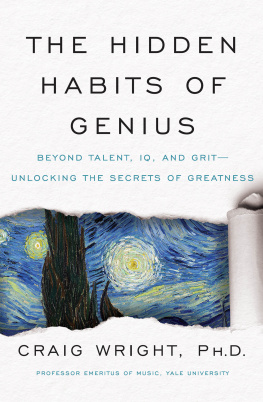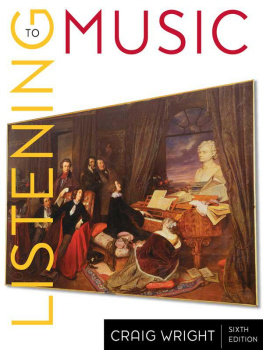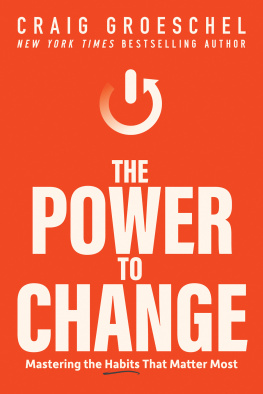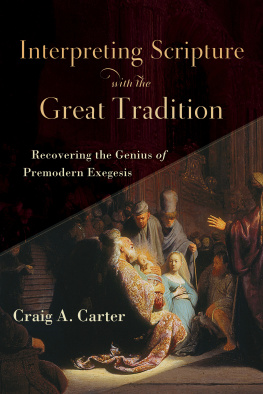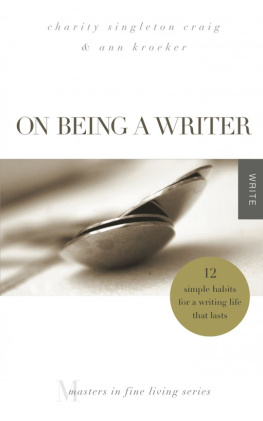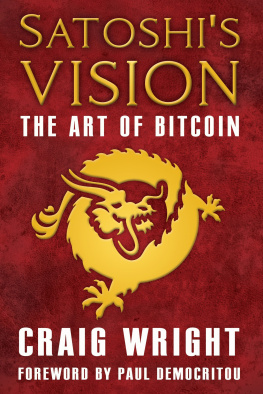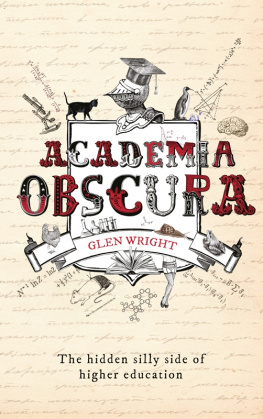Craig Wright - The Hidden Habits of Genius
Here you can read online Craig Wright - The Hidden Habits of Genius full text of the book (entire story) in english for free. Download pdf and epub, get meaning, cover and reviews about this ebook. year: 2020, publisher: Dey Street Books, genre: Art. Description of the work, (preface) as well as reviews are available. Best literature library LitArk.com created for fans of good reading and offers a wide selection of genres:
Romance novel
Science fiction
Adventure
Detective
Science
History
Home and family
Prose
Art
Politics
Computer
Non-fiction
Religion
Business
Children
Humor
Choose a favorite category and find really read worthwhile books. Enjoy immersion in the world of imagination, feel the emotions of the characters or learn something new for yourself, make an fascinating discovery.
- Book:The Hidden Habits of Genius
- Author:
- Publisher:Dey Street Books
- Genre:
- Year:2020
- Rating:3 / 5
- Favourites:Add to favourites
- Your mark:
- 60
- 1
- 2
- 3
- 4
- 5
The Hidden Habits of Genius: summary, description and annotation
We offer to read an annotation, description, summary or preface (depends on what the author of the book "The Hidden Habits of Genius" wrote himself). If you haven't found the necessary information about the book — write in the comments, we will try to find it.
The Hidden Habits of Genius — read online for free the complete book (whole text) full work
Below is the text of the book, divided by pages. System saving the place of the last page read, allows you to conveniently read the book "The Hidden Habits of Genius" online for free, without having to search again every time where you left off. Put a bookmark, and you can go to the page where you finished reading at any time.
Font size:
Interval:
Bookmark:
For our children,
Evan, Andrew, Stephanie, and Christopher,
and for Fred, Sue, and Sherry.
Contents
T oday, genius is all around us, from the helpful employees at the Apple Genius Bar to Baby Einstein products intended to make our kids smarter. The TV reality star Kim Kardashian is called a business genius and her husband, Kanye West, is said to be a jerk who is also a genius. Alan Turing, Martin Luther King, Jr., Abraham Lincoln, Stephen Hawking, and Steve Jobs show up in contemporary films and are called geniuses. Then there are Academy Awardwinning actors such as Daniel Day-Lewis and Eddie Redmayne, who portray the brilliant individuals in those films. Are they geniuses, too? The swimmer Michael Phelps is called a locomotive genius. The tennis stars Roger Federer and Rafael Nadal hit genius strokes. Yo-Yo Ma has been referred to as a cello genius. The College of Business Administration of the University of Nebraska at Omaha offers an annual course titled The Genius of Warren Buffett. On May 23, 2019, Donald Trump stood before television cameras at the White House and declared himself an extremely stable genius. Not to be outdone, North Korean leader Kim Jong Un has dubbed himself the genius of all geniuses.
How do we explain this longing for genius, as the writer George Eliot (Mary Ann Evans) expressed it in 1872? Beneath our excessive popular use of this term rests a serious, timeless, and profoundly human desire to understand the unknown. To do so, we simplify, attributing the complex agency of many previous thinkers to a single, exemplary individual: the genius. Often the genius assumes the qualities of a savior and thus gives humanity hope for a better world. At the same time, the genius provides solacean explanation, even an excuse, for our own shortcomings. Oh, well, no wonder, shes a genius! But still we wonder: How is the magic trick done? What is hidden beneath the surface? Discarding the myths surrounding those exceptional individuals, what were or are their lives and habits really like? And what can we learn from them?
In 1951, doctors at Massachusetts General Hospital wired an EEG machine to the brain of Albert Einstein and watched the bobbing needle in an attempt to find the seat of his genius. Why are we not surprised? Genius involves the complicated expression of too many hidden personal traits to be reduced to a single location and process in our brain or on our chromosomes. How an exceptional individuals traits work together to produce genius will remain a mystery. What these traits are and how they can be cultivated, however, is the subject of this book.
T O BEGIN WITH : W HAT IS GENIUS? T HE ANSWER DEPENDS ON WHOM you ask and when. The ancient Greeks had several words for genius, among them daemon (demon or spirit) and mania (a creative fury that consumed an inspired poet). We get our English word genius from the Latin noun genius, meaning guardian spirit. In classical Greece and Rome, everyone had a guardian spirit, who, oddly, did not belong to him. From the Latin word genius arose the French gnie and from it, in turn, the English genie. Think of the genie waiting to emerge from the magic lantern in Walt Disneys Aladdin films. Think also of the candles on your birthday cake and the wish you make. Since Roman times, those candles and that wish have served as an annual votive offering to your genie, so that your guardian spirit might then do right by you in the coming year.
The list of recognized geniuses from the Middle AgesDante Alighieri, Geoffrey Chaucer, and Joan of Arc might come to mindis short. Did the lights go out in the Dark Ages? No. Genius was simply co-opted and rebranded by the Catholic Church. In classical times one made a wish to ones genius; in the Middle Ages one prayed to a spiritual force with the name of a patron saint, not only for salvation but also to cure an illness or to find a lost comb. The great creations of the erathe soaring Gothic cathedrals, for examplewere the handiwork of mostly nameless, faceless humans inspired by an external divine spirit, the Christian God.
With the Renaissance, transformative thinkers on earth regained a face and a name: Leonardo, Michelangelo, Raphael, and William Shakespeare were just a few such geniuses. Some Italian poets and painters were also dubbed il divino, as in il divino Leonardothe divine Leonardo. Now they, too, like the saints, enjoyed divine powers as semideities. Their hands could shape the ideas that the mind of God might conceive. During the eighteenth-century Enlightenment, however, genius and God parted company. God withdrew, leaving the individual as the lone possessor of genius. Genius was now wholly immanentit came with birth and rested within the individual.
Nineteenth-century Romantic sensibilities caused the face of genius to change yet again, becoming distorted, sometimes bizarrely so. Picture a lone, disheveled, eccentric misfit who suffers for his art. On cue appears Ludwig van Beethoven, the nineteenth-century poster boy for genius. He was, and certainly looked, a bit crazy, singing loudly to himself as he lurched through the streets of Vienna. Around the same time appeared the mad Dr. Frankenstein (in Mary Shelleys famous novel) and then the deformed genius Quasimodo (in Victor Hugos The Hunchback of Notre Dame). Later, a brilliantly deranged Phantom would haunt the boards of the Paris Opraanother disfigured genius.
Today, when we see a light bulb light up over a cartoon characters head, it serves as a visual symbol for that characters bright idea. In truth, that act of geniusthe creation of the modern incandescent light bulbwas the product of Americas first research lab, Thomas Alva Edisons invention factory in Menlo Park, New Jersey. Now Nobel Prizes in physics, chemistry, and medicine are usually awarded to two or three individuals in each discipline, suggesting that in modern times the scientific team has replaced the once solitary Einstein.
The fact that the word genius has changed meaning so often over the centuries tells us that genius is a concept relative to time and place. Genius is whatever we humans want to make it. A genius is whomever we choose to so designate. Purists will object to this transitory, populist approach. Is there no such thing as absolute truth and beauty? Are not the symphonies of Mozart and the equations of Einstein universal and eternal? Apparently the answer is noit depends on whom you ask. The music of Mozart (17561791), although still revered in Western concert halls, has no special resonance among the citizens of Nigeria, for example, who have their own beloved sounds and musical heroes, such as the Afrobeat pioneer Fela Kuti (19381997). Einsteins explanation of gravity is merely one of four to hold sway since the ancient Greeks. Rays of genius in the arts and sciences are bent over time by different cultures and by each new generation that encounters them. Until recently, the history of the genius in the West was populated by great men (meaning white men), with women and people of color largely marginalized. But that is changing, and it is up to each of us to decide what constitutes exceptional human accomplishment.
Almost all dictionary definitions of genius include the words intelligence and talent. We will explore what it means to be intelligent in
As early as 1919, Nikola Tesla foresaw radio, robots, solar heating, and a cellular smartphone not bigger than a watch. Today two-thirds of the people on the planet are connected by the sort of internet phone that Tesla predicted. In 1995, while working at a quantitative hedge fund in New York, Jeff Bezos observed that traffic on the internet had increased 2,300 times over the previous year; he also realized that driving from store to store was an inefficient way to acquire merchandise. He envisioned Amazon and started with books. Twenty years later, his company had grown into the worlds largest e-commerce marketplace, selling nearly every product imaginable. The only absolute in life, it turns out, is change, and the genius sees it coming.
Font size:
Interval:
Bookmark:
Similar books «The Hidden Habits of Genius»
Look at similar books to The Hidden Habits of Genius. We have selected literature similar in name and meaning in the hope of providing readers with more options to find new, interesting, not yet read works.
Discussion, reviews of the book The Hidden Habits of Genius and just readers' own opinions. Leave your comments, write what you think about the work, its meaning or the main characters. Specify what exactly you liked and what you didn't like, and why you think so.

